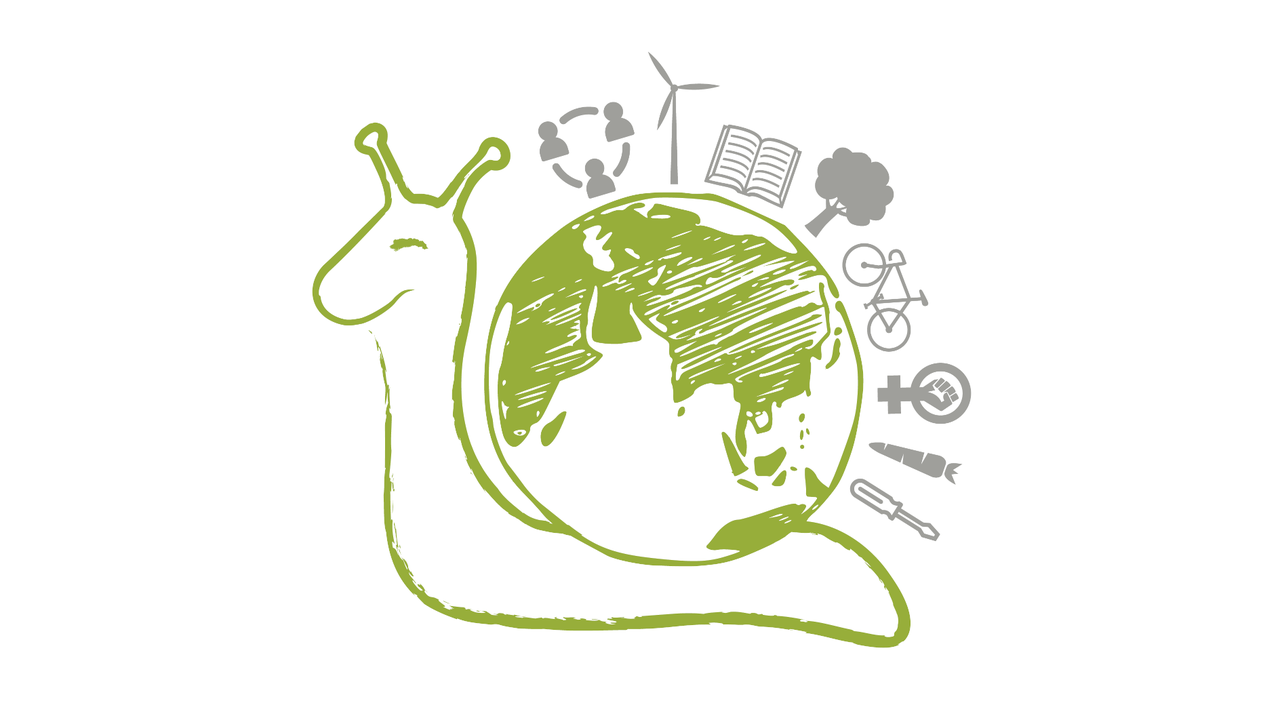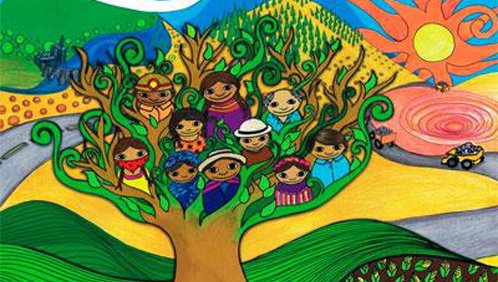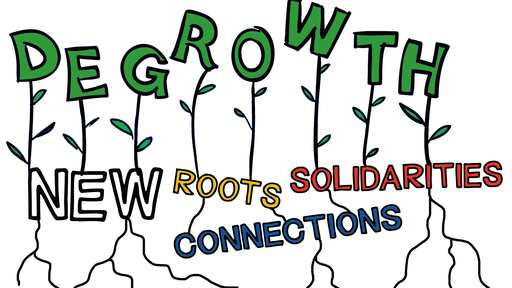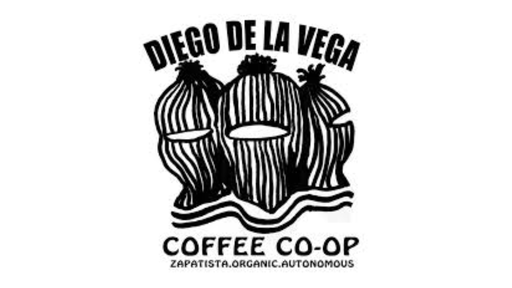Tackling the real drivers of biodiversity loss and exploitation
From economic growth and overconsumption to alternative economies and systems change

At this moment of Earth' history the future of human societies seems very uncertain. This is the result of systems of oppression such as patriarchy, racism or colonialism which have led to capitalist exploitation of peoples and ecosystems. These systems have always – until today - been challenged by people engaging in diverse resistance struggles on the one hand and a "pluriverse of alternatives" on the other hand. As European industrial societies we can learn from those alternative forms of community organization how to restore our relationships with people and non-human nature.
Despite colonization and oppression many Indigenous people have kept in place their value systems and mythology which often focuses on the interrelation of human and non-human life and community life. Similar values are part of the DNA of concepts like Buen Vivir (Sumak kawsay, Quechua) in South America or Ubuntu in Sub-Saharan Africa. While rooted in their local communities and lived practices they share notions of a good life not for separate individuals but community/society as a whole, in respectful and reciprocal relationships with the surrounding ecosystems which also are seen as life-giving, living entities (Pachamama).
Movements in the global North aim to rediscover and foster such traditional value systems that are buried under the hegemonic capitalist values of egoism, competition and exploitation. It is clear that western societies can not simply adopt the worldviews and traditions of other cultures but need to find their own way forward, including the need to repair past harms inflicted on other communities. Alternative ways of living should be based on the notion of sufficiency and would therefore reduce the ecological destruction both in global North but more so of global South ecosystems and communities through extractivism and exploitation. Supporting current resistance struggles in the Global South is a key part of lived solidarity and may include targeting headquarters of international corporations responsible for pollution or land grabbing.


Degrowth is a concept that challenges the economic growth paradigm of capitalism and aims to reframe the idea of human prosperity. To reduce the destructive overconsumption of materials and resources all damaging and unnecessary economic activities must cease. Sufficiency and distribution are key to enable a good life for all people and non-human life on the planet. Initiatives which practice some of these ideas in western societies are ecological villages, permaculture projects or Transition Towns, though none of them are yet able to redefine the mainstream. Rediscovering the human interconnection to land and ecosystems is at the core of many such endeavors.
Re-establishing local and global commons is an important component of many different transformation concepts. The access to public and community-managed resources reduces overall material consumption (e.g. public transport vs. individual cars) and provides a more just way of fulfilling fundamental needs of people such as food, shelter and community - but also cultural, emotional and intellectual needs that are met by a "common wealth" that is regulated but also accessible to everyone. Commons support the redistribution of power from corporations to local people and communities. Communal well-being is perceived as more important than private property and individualistic desires. This is not to the detriment of the individual, but on the contrary meets deeper individual needs (communities provide material and social security, consensus building leads to stronger social ties that support each individual) The concept of managing resources as commons contributes to rediscovering the interconnectedness of people and communities with each other and includes the care for future generations of those communities.
Cooperatives aim to re-establish a more direct connection and ownership of people and communities to production and meaningful work, while also striving for autonomy and a more just and sustainable economy in general. They can be found in a range of contexts, from local projects inside a predominately capitalist economy to being economic pillars of established autonomous zones like the Zapatistas in Chiapas, Mexico (Indigenous autonomy) or the multi-ethnic Democratic Federation of Northern Syria ("Rojava").
The concept of eco-socialism is much discussed in South America in particular because communities have suffered from capitalist extractivism through pollution and land dispossession without much if any improvement of living conditions. Eco-socialism is build on the concept of socialism but is centered on the idea of an economy within planetary limits. It aims to create societies and economies that don't grow forever, but focus on fair distribution. A similar idea is proposed by Kate Raworth in the concept of Doughnut Economics.
Another concept originating in India - "Radical Ecological Democracy" builds on a Ghandian notion of "swaraj" or autonomy and independence on the level of the community and seeks to re-establish an understanding of democracy where people regain power over decision-making. It describes a deeply ethical way of being that is not infringing the rights of other beings to live. Understanding of the ecological processes, ecosystems, and biological diversity that are the basis of all life on Earth leads to consciousness and respect of the ecological limits to which human economies and societies must restrict themselves.
To summarize, alternatives to the "imperial mode of living" are abundant all over the world and provide inspirations or/and blueprints for a different way of co-existing with other people and Nature. It's important to imagine all of those ideas in their own particular context, forming a global "pluriverse", contrary to a single ideology imposed on as many people as possible.
Sources
We would like to share the materials collected on this page in a spirit of support and solidarity.
As a small group, we unfortunately do not have the capacity to research all the contacts and contact the authors, creators and contributors of the materials listed on this page and to ask them explicitly for their permission, to be linked in this context.
If you are the author, creator, or contributor of any of these materials of any of these materials and do not consent to their use in this context, please let us know at presse(at)extinctionrebellion.de and we will remove it.
VIDEOS
New Economies: How Degrowth Will Save the World with Jason Hickel
Leaflets: What is Eco-Socialism and Who was Chico Mendes?
Eco India: How Gandhi's idea of Swaraj is inspiring communities to take charge of their environment
On Radical Ecological Democracy
Connecting Equality, Justice and Sustainability - Permaculture Action Network
Neighbor Democracy: The Communes of Rojava: A Model In Societal Self Direction
A deep dive into the structure of society in Rojava by Ian Campbell
Our Changing Climate: The Problem with Consumerism
A look at why green growth does not work
ARTICLES
yes!magazine: What an ecological civilization looks like
A great collection of short entries on various concepts/movements/topics for transformations across the world
Good introduction to the root causes of biodiversity loss. Exploding human consumption as the main cause of mass extinction - but as capitalism is made invisible as the underlying problem it leads to the wrong solutions.The different contributions to the crisis globally are also obscured by the (humanity) "we".
Uneven Earth, François Schneider and Joanna Pope: Degrowth
Medium, Nafeez Ahmed: Capitalism is destroying ‘safe operating space’ for humanity, warn scientists
According to a study in the journal Nature Communications the richest 10 percent of people are responsible for up to 43 percent of destructive global environmental impacts. Capitalism’s structural obsession with endless growth is destroying the very conditions for human survival on planet Earth.
Al Jazeera, Jason Hickel: The racist double standards of international development
On global inequality and how a ridiculously low "poverty line" set by western insitutions tries to hide it. In a racist double standard of international development, working conditions and wages are perceived very differently in the "North" and in the "South".
Medium, Nafeez Ahmed: Green economic growth is an article of ‘faith’ devoid of scientific evidence
Refuting the myth of decoupling of material use from environmental impact (the core idea of green growth)
In-depth reading:
RLS, Jamie Tyberg: Unlearning: From Degrowth to Decolonization
Undisciplined Environments, Giacomo D’Alisa: Ecosocialism versus degrowth: a false dilemma
A look at the developments and motivations for the growing "love affair" between conservation NGOs and corporations
Socialist Resistance: Making Rewilding Part of a Socialist Future
Interesting analysis of the "rewilding" trend, where does it have the potential to challenge capitalisms paradigms on one hand and how is it used as an exclusive and elitist form of nature conservation on the other hand.

